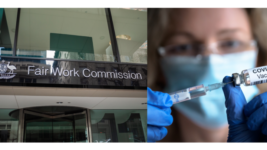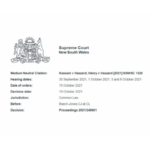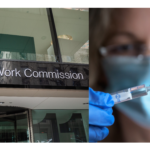Deputy President Will No Longer Hear Claims Regarding Vaccine Mandates

The Fair Work Commission’s Deputy President, Lyndall Dean, who expressed her views against vaccine mandates in a published judgement last month, has been banned from hearing vaccine-related cases and excluded from the Commission’s full bench until “she completes professional conduct training”.
Ms Dean was the dissenting judge in the case of Jennifer Kimber vs Sapphire Coast Community Aged Care.
The aged-care receptionist’s position was terminated after she refused to have an influenza vaccination in accordance with her employer’s workplace policy.
She took the case to the Fair Work Commission, which found that she had not been unfairly dismissed by her former employer.
Her subsequent appeal was also rejected by the Fair Work Commission’s three member panel, by two members to one, on the basis that the FWC can only grant permission to appeal where it considers this to be in the public interest.
According to the majority, it was not in the public interest to allow Ms Kimber to appeal the initial decision against her.
Ms Kimber’s lawyers say their client will now take the case to the Federal Court of Australia.
Deputy President Dean’s remarks
The case generated an enormous amount of public interest, primarily as a result of the dissenting member Ms Dean’s judgement.
While the Kimber Vs Sapphire Coast community Aged Care case is not directly relevant to COVID-19 vaccinations, Ms Dean took the opportunity to acknowledge the growing concern amongst Australians regarding mandated ‘no jab, no job’ policies.
The Deputy President warned employers against implementing ill-considered mandatory workplace vaccination policies, and in her dissenting judgement remarked:
“Never have I more strenuously disagreed with an outcome in an unfair dismissal application. The Decision manifests a serious injustice to Ms Kimber that required remedy. More egregious, however, is that the Majority Decision has denied Ms Kimber the protections afforded by the Fair Work Act in part because of “an inference that she holds a general anti-vaccination position.”
“… blanket rules, such as mandating vaccinations for everyone across a whole profession or industry regardless of the actual risk, fail the tests of proportionality, necessity and reasonableness… and should be soundly rejected by courts when challenged…”
“All Australians should vigorously oppose the introduction of a system of medical apartheid and segregation in Australia because… it is an abhorrent concept and is morally and ethically wrong, and the anthesis of our democratic way of life and everything we value…”.
She decried the censorship of views that question the current policies regarding COVID-19 vaccinations, expressing the view that “all Australians, including those who hold or are suspected of holding “anti-vaccination sentiments”, are entitled to the protection of our laws, including the protections afforded by the Fair Work Act.”
More recently, it is alleged that Ms Dean also expressed her support for a post on LinkedIn which argued that public-health measures implemented during the pandemic are akin to “Chinese-style totalitarian social control”, commenting: “I fully agree”.
Complaint to Fair Work Commission
The Fair Work Commission says it received ‘a complaint’ about Ms Dean.
It claims that as a result, the President of the FWC, Justice Iain Ross, directed his deputy to “attend training on responsibilities and standards of professional conduct expected of a member of the commission”.
The Commission also reported that Ms Dean “has disqualified herself on the grounds of bias from adjudicating disputes relating to workplace vaccinations in future”, although there are suspicions that the self-disqualification was actually the result of pressure by the Commission.
The perception of bias
Those in judicial positions such as Ms Dean are expected to remain neutral in order to ensure that the cases they preside over are judged with fairness and impartiality, and that judgements are based on the merits of the information presented before the tribunal, or court.
But there are other considerations too – such that in a democracy people are allowed to have a personal opinion and express it.
Furthermore, opposing opinions should be encouraged to create robust debate and comprehensive discussions, which are also hallmarks of democracy.
The comments made by Ms Dean in her judgement of the Kimber vs Sapphire Coast Community Aged Care case seemed, at the time, like a sensible voice of reason in amongst a strong government, business and social narrative of “vaccinate at all costs’.
Ms Dean’s judgement appeared to be comprehensive and well researched. And, what’s more, it seems to have resonated with a significant part of the Australian population.
RIP democratic freedoms
People have been feeling that their freedoms have been slipping away for years, but, understanding their responsibilities to limit the spread of the virus, millions have endured lockdowns, masks, social distancing, border closures, curfews and travel limits, and in many cases, reduced working hours and job losses.
However, when it comes to actually being coerced or forced to have a vaccination — a medical procedure — people are much more hesitant and a significant number prefer to exercise their right to personal choice and informed consent. To take this choice away amounts to tyranny.
It’s disappointing to say the least, that on the basis of ‘a complaint’ which we can safely assume is a single complaint, that Ms Dean is temporarily suspended from duty.
And it’s concerning too, that it’s not a ‘one off’ scenario.
Pressure to shut up and vaccinate
Earlier this year GPS were threatened with deregistration if they disseminate information about Covid-19 vaccines which regulators consider to be false or misleading.
Federal MP Craig Kelly was recently threatened with legal action by the Therapeutic Goods Administration for disseminating information to his database and social media followers.
Protests have been shut down, and people have been arrested for opposing lockdowns and vaccination mandates.
Prime Minister Scott Morrison is pushing for a law to stop Emergency Cabinet papers from being made public. The Emergency Cabinet has steered Australia’s pandemic response at a Federal level, and these documents could provide useful information should we face a similar threat in coming years.
A good question to ask is why?
Why isn’t there more transparency and open discussion about all aspects of the Covid-19 debate, including pandemic management strategies and vaccinations?
Without openness, mistrust begins to fester.
President Kennedy said it best in a speech, when he remarked that secrecy should be repugnant.
“No President should fear scrutiny of his programme. From that scrutiny comes understanding, and from that understanding comes support or opposition and both are necessary…. Without debate, or criticism no administration and no country can succeed.”







